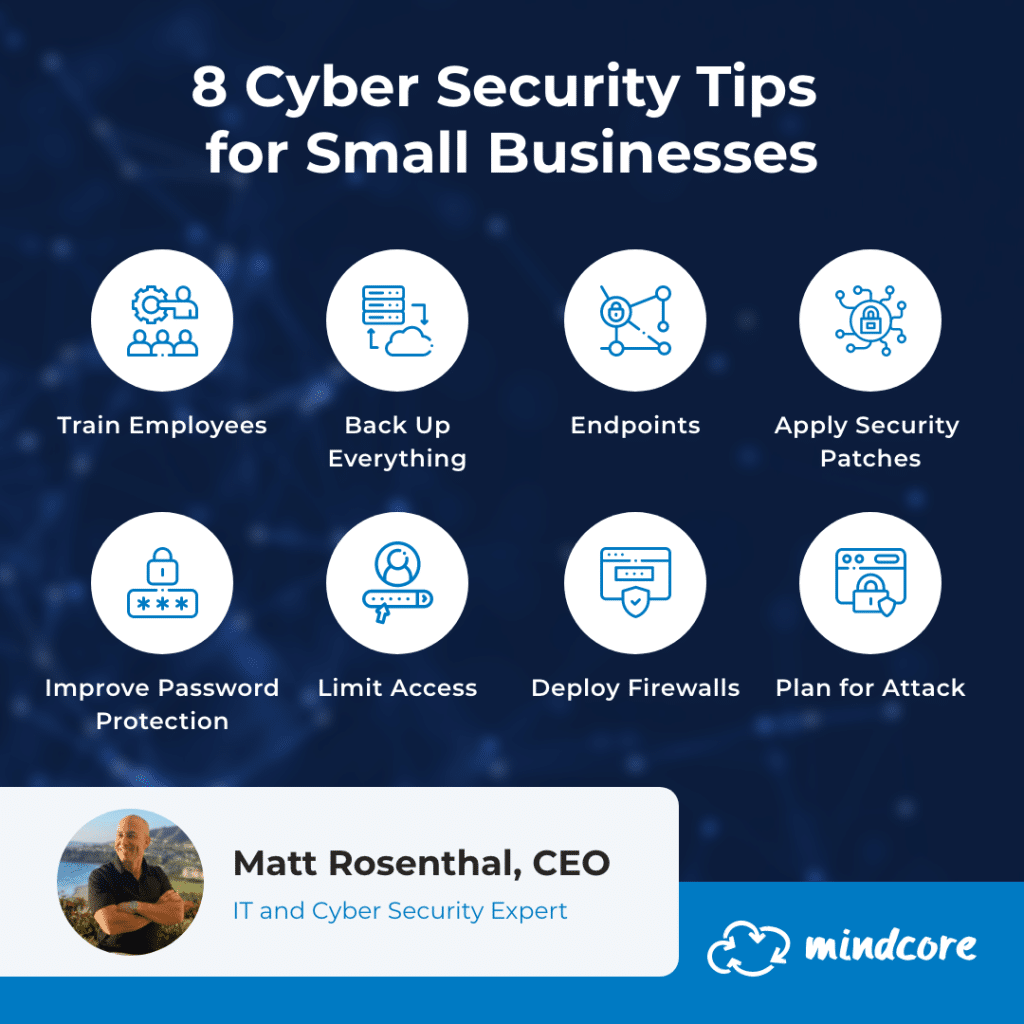
Large enterprises typically have the resources to protect themselves against ever-evolving cyber security threats. But smaller businesses have tighter budgets and fewer resources, which is one of the main reasons why hackers target them. The good news is that adequate cyber security is not beyond reach. Small businesses can take a number of steps to secure their cyberspace. Here are our eight cyber security recommendations for small businesses.
1. Train Employees
Humans are the “weakest link” in cyber security. Even with technical support staff in place, employees can unintentionally cause breaches if you do not train them properly. Establish basic security measures, such as requiring strong passwords. Make sure employees understand how to use company resources and penalties for failing to follow security guidelines.
2. Back Everything Up
Does your company back up its files? If a cyberattack happens, your data could be compromised or deleted for good. Given the amount of data you might store on laptops and mobile devices, most businesses wouldn’t be able to function after an attack. Utilize a backup program that gives you the ability to schedule or automate the backup process, so you don’t have to remember to do it ahead of time.
3. Secure Endpoints
Laptops and mobile devices are among the most vulnerable endpoints or entry points to a network. No matter what device you are using, you must secure it to help prevent a compromise. Make sure you’ve installed the latest anti-virus software to protect against viruses, spyware, ransomware, and phishing scams. Run regular checks and make sure someone is responsible for updating the software regularly.
4. Apply Security Patches
Security patches are issued to address vulnerabilities in a company’s operating system, which offer improved security, including bug fixes, new security features, program stability, and a better user experience. Businesses need strict patching policies to eliminate the chance of users missing critical software updates.
5. Deploy Firewalls
Implementing a firewall on your network should be one of your top priorities. Firewalls block unauthorized content with controls, such as access denial to IP addresses known to deliver malware. Even if a malware payload is delivered, a firewall can prevent it from communicating with the command-and-control (C&C) server from which it would receive instructions to lockout data.
6. Improve Password Protection
Although users tend to resist them, passwords are necessary to protect computer networks. Require employees to set unique passwords, using a combination of numbers, special characters, and upper and lowercase letters to make passwords harder to crack. Also, you should establish a policy that requires you to change passwords periodically – at the very least, quarterly.
7. Limit Access
Layered security can help minimize vulnerabilities and prevent users within the company from accessing information they are not authorized to access. Employees should only be given access to the specific data systems needed for their jobs — known as role-based access control — and should not be allowed to install any software without permission.
8. Plan for Attack
No security measure is 100% foolproof. It is worthwhile to develop an incident response plan (IRP) outlining what steps you should take and who is responsible for collecting, analyzing, and acting upon information gathered from an incident. These plans are necessary to minimize damage caused by threats, including data loss, abuse of resources, and the loss of customer trust.
Manage Your Cyber Security with Mindcore
Mindcore provides New Jersey and Florida businesses with comprehensive cyber security services, such as network monitoring and penetration testing, to protect against online threats. Our team has years of experience and will work with you to build a secure IT infrastructure. Contact us today to schedule a consultation or learn more about our cyber security solutions for your small business.

